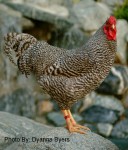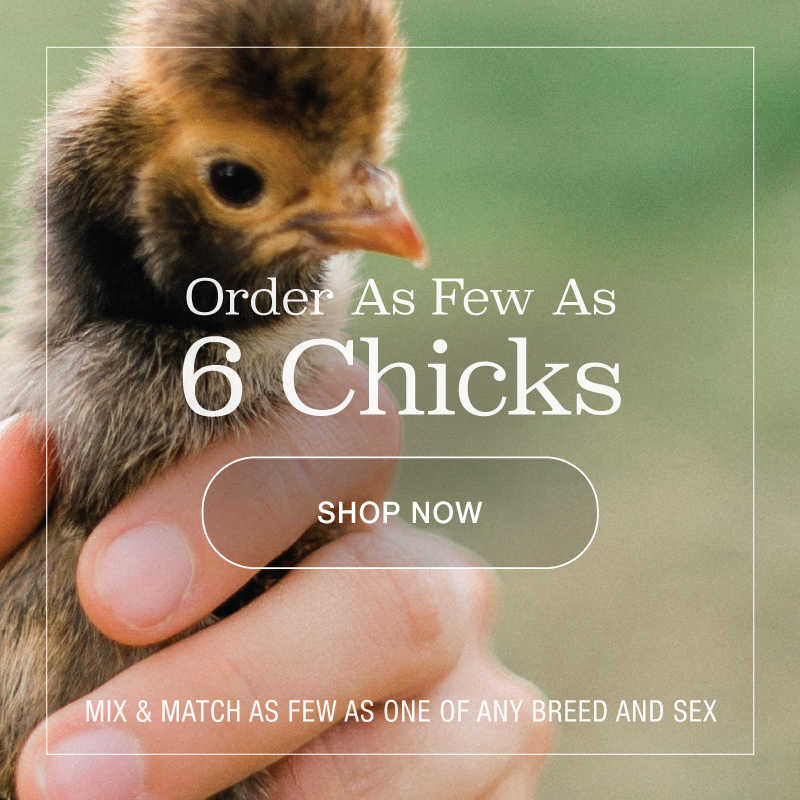 History
History
Dominiques are one of America’s oldest chicken breeds. They were originally brought here from England and were common on American farms up through the 1800s.
Qualities of the Dominique
If you’re looking for a sustainable breed of chicken, and particularly if you have plenty of room to let your chickens free range, there are several good reasons to consider the Dominique:
- Foraging – Dominiques are well known for being good foragers. They will actively search out and eat insects and seeds, which cuts down on garden pests and reduces feed costs.
- Broodiness and rearing baby chicks – Dominique hens often go broody and generally make good mothers.
- Brown egg layers – Dominiques are moderate layers of brown eggs. The eggs tend to be medium in size or smaller.
- Meat – Dominique roosters reach about 7 pounds at maturity. This is not as large as some of the other heavy breeds, but big enough for a good meal. Hens are about 5 pounds at maturity.
- Cold Hardy – Dominiques have rose combs and fluffy, heavy plumage, which makes them well suited for cold climates. They also lay well through the winter.
The Dominique and the Barred Plymouth Rock
Originally, Barred Plymouth Rocks, or Barred Rocks, as they are commonly known, were partially derived from the Dominique. Although both breeds share similarities in their plumage coloration, they are distinct from one another.
Below are some of the differences:
- Comb Style – Dominiques have a rose comb. Barred Rocks have single combs.
- Plumage Pattern – the barred pattern of the Dominiques’ plumage is wider and more uneven than that of the Barred Rock.
- Tail Length – Dominiques have a longer tail than Barred Rocks. This is true of both roosters and hens.
Video of Baby Dominique Chicks
httpv://www.youtube.com/watch?v=M7EM9Vr5qqk
Availability
To check the availability of Dominiques on our website, visit the link below:
Other Names for the Dominique
The Dominique is also known as the Dominicker, Pilgrim Fowl, Puritan Fowl, or Plymouth Country Fowl.
Feedback
We’d like to hear from you. If you’ve raised Dominiques, please leave us a reply letting us know what your experience with them has been.



We have a mixed flock of Cochins (standard and bantam) and Dominiques. Our four Dominique rooster brothers are excellent protectors for the hens. We really admire how they share protection duties and communicate about where their groups of hens are hanging about throughout the day. We did have a 5th rooster who took a dislike to one of the dogs, so we gave him away. All the roosters are friendly and love to take seeds (especially peanuts) from our hands. One downside to the breed is that they are not well disguised in our forest-edge location, and the hawk has picked off most of the Dominique ladies.
What do you think about Buff Orpington breeds?
Becky,
Buff Orpingtons are a very nice breed of chicken and are very popular. They are docile, good layers, and excellent setters and mothers. For more information, please visit this link to our website:
Buff Orpingtons
I have raised a variety of chickens, and Dominiques have the best personality, I’m just now getting pullet eggs from the 25 I ordered this summer. They are the sweetest and I think make a beautiful flock. I have a 3 yr old rooster and Dommy Mommy in another coop, they are the nicest, smartest chickens ever. I’m so thankful for the chance to be a “chicken freak”.
I have about 30 Dominiques. As chicks they have been my most aggressive birds, considering I have about 15 breeds. My Dominique is my best seller. The 30 I have are a replacement batch. People love to buy the roosters because he is a protector like the previous comment. Come bad weather, good weather the roosters stand around watching. I have 2 grown roosters at the moment the rest are hens.
Dominiques are hardy, none have ever gotten sick, whereas my other breeds have had issues with crooked beak, some got fowl pox, the Dominiques didn’t get any of that. Its a very resistant bird. They are free range, and they would rather look for food than eat the feed. About once a week I cage them, and they eat feed with the vitamins they need. When I have visitors they think it’s a most attractive bird because of the plumage and rose comb, which can be very large on the rooster and the hen.
They are very active. They run around the place as if they had somewhere to go. They are actually fun to watch, and they are very human friendly. I had issues with other breeds where the rooster can be very aggressive with humans. The Dominique rooster doesn’t have that problem. He is too busy looking after the hens.
Our Dominique “Chocolate” came as a free rare breed chick from Murray McMurray Hatchery, along with a batch of X rocks we were raising for meat. My daughter adopted it and raised it in her bedroom. When it was too big for the bedroom brooder it was moved out into the shop enclosure. When it was determined to be a hen we put it in with our egg layers. I have never seen a more friendly, soft and broody chicken. Chocolate would sit on two eggs if given the chance. We were going to let Chocolate hatch some eggs and become a mother until a raccoon took Chocolate. We will be getting more Dominiques this spring. The one small brown egg per dozen has been our trademark since Chocolate and will continue. What a great breed!
We have had Dominique chickens on our farm for 3 years. Although they are very good foragers and are not agressive birds, I do take issue with “going broody and laying well in the winter”. Our birds (we have a flock of 30 hens and two roosters) do not lay at all well in the winter. We might get an egg every other day. Now I will say we do not put artifical lights in their coop. This might help, but we can’t run power out to that area of our farm. We also have to incubate eggs each year as none of our hens will go broody. One point that they do have in their favor is our hens lay large to extra-large eggs. I do like these birds over others that we have had because of this fact.
I bought 2 Dominique pullets at the local farm store 2 years ago and raised them with my 4 Silkie hens, 1 Silkie rooster, and 1 Americana hen. They all got along great. The Doms are so stately and serious. Unfortunately, something got into their house and killed/ate all but one Dom. She was very traumatized and is now in with the ducks. The ducks have taken her as one of their own. She still seems lost. When the weather gets better, we will rethink the house situation.
Our Dominique rooster “Black Black” is a terrific and admirable bird. Three times this winter he has actually attacked a hawk that has attacked our hens. By distracting the hawk it has given us enough time to get outside and scare the hawk away and literally get the hen out of the hawk’s talons. All the hens have survived so far. He is not aggressive towards our family although he doesn’t like strangers. He is very cold hardy and always goes out with the hens on the coldest days, unlike our Dorking rooster. Our birds are total free range, and Black Black is very suited for that. We love him and highly recommend the breed.
We have a Dominique named Rocky (we thought she was a barred rock when we named her as a chick). She is about 18 months old. She is very sweet and much quieter than our other hens. She doesn’t mind being held, even though she is somewhat timid and smaller than the other hens, she puts them in their place.